Does Ocarina of Time Still Hold Up By Today’s Standards?
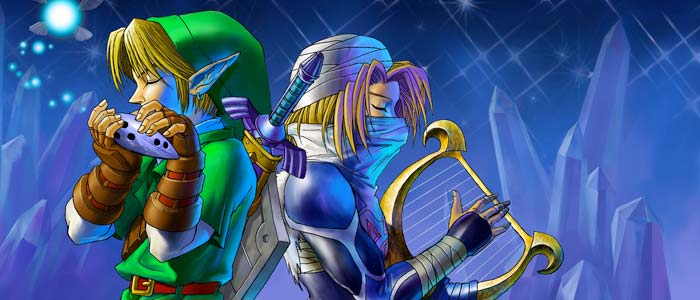
Despite all its evolutions over the years, no entry in the Legend of Zelda series has stood the test of time in terms of critical acclaim to the extent that Link’s first fully 3-D adventure has. Even after almost two decades, it’s still widely considered one of the greatest games of all-time. After all, not only did we all play it during childhood, but the reason we did so is because for its time, it was incredibly revolutionary in terms of what you could accomplish in terms of both the formula and open-world gameplay. And with over three million copies of the 3DS remake being sold as of this time of writing, it is apparent that Ocarina of Time will not be fading from public memory anytime soon.
But whilst the impact of the second-most acclaimed N64 title next to Super Mario 64 can’t be denied, does it still stand the test of time by today’s standards? If Shadow of the Colossus can be just as fun to play now as it was back in 2005, then could the game that it clearly took inspiration from to the point that it might as well owe its existence to it follow suit? To answer this question, let us take a look at some of the most important aspects of Ocarina and see how they stand up by today’s standards. One thing that will not be looked at are the graphics, because there is a reason that Nintendo felt the need to upgrade them for its 3DS port rather than keep them at the same level of its Gamecube ports, and any analysis of them would lead nowhere.
The Open World and Locations
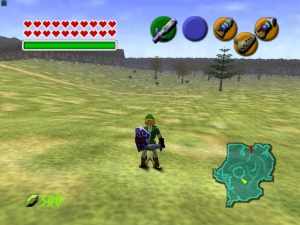
First, let us look at the world itself. While it may look small when compared to today’s vast epics like Skyrim, there’s no denying that Hyrule Field alone is a huge place that to this day still makes the player feel like an ant when they fully realize just how important the journey actually is. Unless you’re traveling on horse, which you won’t be able to do until about a third of the way through the game, traversing the area can take a really long time with most players having to battle skeletons at night before they can even enter Hyrule Castle for the first time. This can be considered both a good and a bad thing, because whilst it’s enthralling to explore big open worlds, said feeling can be diminished if the actual traveling isn’t fun in of itself. And unfortunately, no matter how much you roll on the ground or side jump, the fact of the matter is that Link is not a sprinter in the least.
But that didn’t matter too much back when the game first came out, because the very idea of traveling in a world of this size was inconceivable in the late 90s and there’s no getting around the fact that even today, Hyrule Field feels alive. From the lush large green landscapes that connect every various location you need to go to, along with hidden secrets, a day/night cycle, and enemies that can attack you at any time depending on where you are at a specific time, this open world still serves as a functional case of using exploration as its own gameplay mechanic. And the fact that every location it connected to felt natural to the game’s setting as well as lively on its own is a plus too. Not to mention, who can forget the moment when you finally got to ride a horse on that field? So while it has some more apparent faults now, the open world still holds up fairly well in terms of scale and functionality.
It’s not just the open world however. Although the locations are obviously smaller in scale compared to Hyrule Field, they are vast and varied on their own terms. From the long trek up Death Mountain to the large amount of water in Hyrule Lake, Ocarina of Time knows full well that you can’t just rely on the bigness of the connecting world to carry the exploration aspect. The places that you have to explore to must be fun as well, and you shouldn’t limit it to the dungeons. Whilst they are the areas where Zelda’s real challenges should come into play, the areas directly connecting them should feel important as well, and Ocarina of Time accomplishes that to a tee. Secrets and life that actually progress gameplay from heart pieces to gold skulltulas litter these places in order to provide substance beyond the spectacle, and it helps when said locations are populated by colorful characters you can interact with. That said, one thing that’s very noticeable now is that there’s not much you can do to actually “affect” the areas or characters themselves apart from the occasional side quest that rarely changes much. Link participating in the local activities will usually only benefit him and nobody else, so don’t expect a brand new marketplace to appear from your various donations. So in that sense, Ocarina is a bit left behind.
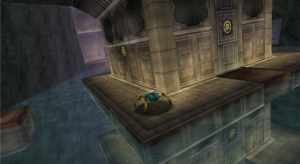
As for the dungeons themselves, it has been argued that they’re too easy by current-day standards (hence the Master Quest edition) and the Water Temple has achieved a not-so insubstantial amount of criticism for its overcomplexity amongst other things. But even so, they still require a bit of brain work and you still spend a decent amount of time in them without much of a sense that they’re overstaying their welcome. There’s not much to really say about them aside from just like the locations, they’re still fine in their own right in terms of variety and secrets, but the standards of complexity have no doubt increased since 1998.
All in all, the game’s various set pieces have some age on them, but they’re still imaginative without dwarfing the player under their scope and there’s quite a lot you can do in them. Maybe a bomb in that area will open up a hole. Or maybe you can plant a bean here so that seven years later, you can increase your health or go fishing without having to beat an overly long temple in order to catch an 18-pounder.
The Characters
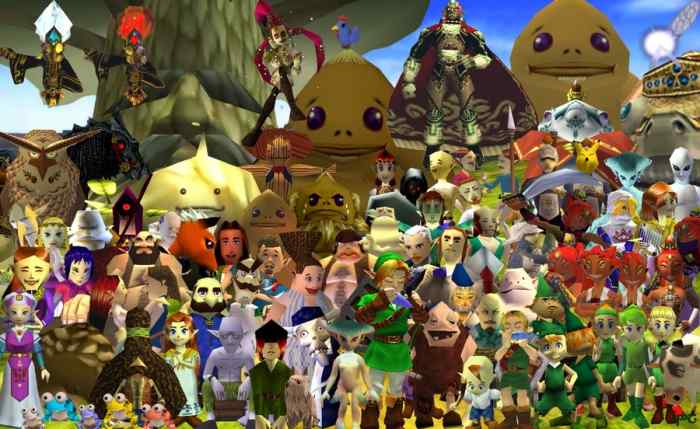
Ocarina of Time is probably the one game that sees the most returning characters in later parts of the franchise (certainly a lot of the Zelda characters in Super Smash Bros seem to come from the game). It was the first game to give Ganon a human form under the name of Ganondorf – a form that has since been used in almost every 3D Zelda game afterwards to the point that his original Moblin form might as well be a temporary powerup – and it was also the first to introduce Zelda’s famous alter-ego, Sheik. But more importantly, it was the first game to introduce Link’s iconic adult form, as the previous games mostly portrayed him as a kid that’s a few years older than his younger self in Ocarina. But those are just appearances. How do they stand as contributing players to the Zelda universe based on this game?
As is pretty much common knowledge by now, Link was created solely to be a blank cypher that the audience is meant to project themselves onto, so his overall personality is entirely dependent on the player, although you can’t beat the game without portraying him as a hero, so he’s always going to be a goody two-shoes. Nevertheless, he doesn’t even have much of an expression other than constant frowning or the occasional smile/surprised look (the blank look he had as Rauru told him Ganondorf stole the Triforce during his slumber being a particular stand-out), let alone any noticeable thoughts when you’re not in direct control of him and thus isn’t going to astound academics as a fully fleshed-out main hero. There is some backstory given to him, but it adds little to the overall narrative and thus might as well not be there. As is such, it’s up to the characters surrounding him to liven up the game.
Although the other characters are definitely memorable and do a good job of compensating for Link, they also do not have much to them, especially once they fulfill their game-important role. Zelda spends most of her screen time as Sheik and aside from that, she’s only really important after the first battle with Ganondorf. After Saria teaches you her song, she never really does anything after that. Malon and Talon mostly just say hello after you’ve gotten all you need from them. And despite Impa’s popularity, she’s almost all but non-existent after you first meet her. This is just the plot-important characters mind you. The majority of Hyrule Castle Town’s residents (who move to Kakariko in the future) each have unique designs, but they pretty much exist for no reason other than small talk and the occasional hint/heart piece. The Gorons, Zoras, and Gerudos all look the same minus the important ones and don’t have much more to offer. As for Navi, she can be annoying, but she tries hard and serves as a functional heart to Link’s journey.
The phrase that best sums up the characters are “memorable, but very little of them”. And since later 3D Zeldas would make its large cost more interactive to the story/gameplay, this could make Ocarina very awkward to players who are used to only Wind Waker or Twilight Princess. So while the characters themselves have aged fine aside from maybe Link himself, their lack of presence hasn’t.
The Story
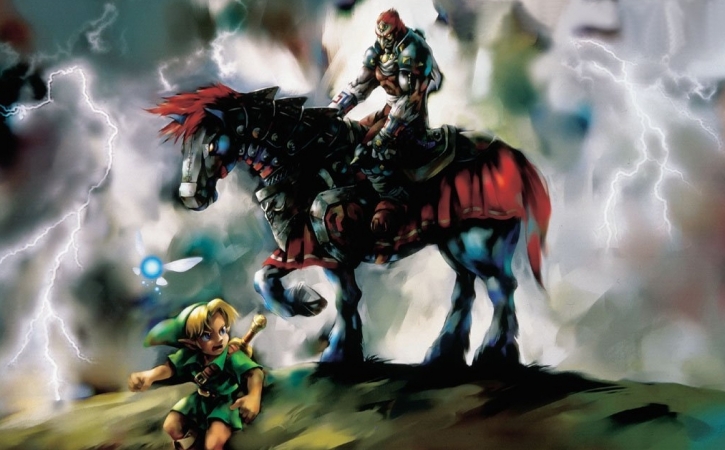
If there’s anything anyone can agree on regarding Ocarina of Time, it’s that the story is very simplistic and is more remembered for its scope rather than the actual details. There’s not really much to Link’s journey besides him collecting mystical artifacts in order to take down an evil king who mostly just sits back and waits for the hero to beat his generals rather than take matters into his own hand, and said journey is incredibly underdeveloped on the personal end of things, mostly because it lacks a compelling reason for Link to partake in this journey in the first place. For instance, the reason Link starts his journey is because his guardian, The Great Deku Tree, tells him it’s his fate and he accepts that without question. Whilst it’s true that his guardian’s death might be a contributing factor and that he might possess a sense of vengeance towards the person responsible, The Great Deku Tree’s presence all but drops out of the story apart from some brief instances in the Forest Temple arc in order for Zelda to take over as Link’s main motivation. And at that point in the story, Ganondorf hasn’t taken things over yet, so all Zelda has to go on regarding sending Link out to fight evil are dark dreams and the fact that the Gerudo King is so obviously evil that it’s a wonder the King allows him into the castle.
Of course, this backfires as Zelda’s decision to gamble on Link causes Ganondorf to steal the Triforce and in seven years, Hyrule was turned into a land full of monsters. However, whilst the consequences are definitely apparent (the first thing you see as you leave the Temple of Time is a broken down town and a giant crown of fire over Death Mountain), Zelda is the only one who really grasps what her actions have done and that’s only at the very end of the game. Nobody else really has a personal stake in what’s going on and even when they do (ex. Darunia’s confrontation with the Goron-eating dragon in order to free his brethren), we never get to see their side of the story or have them contribute in any visible way (Malon practically adds nothing to the Lon Lon Ranch subplot other than to be an extra motivation to complete it). Practically all of the story is on Link and his limited interactions with everyone else. Combine that aspect with the simplistic characterization of our main hero and you have one aspect of the series that has not aged well. Its own direct sequel had a unique story, and every console Zelda afterwards – regardless of overall quality – has injected life into the formula by introducing personal arcs to carry Link through his dungeon-hopping adventures. Throw in everything else it inspired and it’s apparent that if you are a huge proponent of video-game storytelling, which has become more important to video games nowadays than it was in the 90s, Ocarina of Time won’t scratch that itch.
The Gameplay
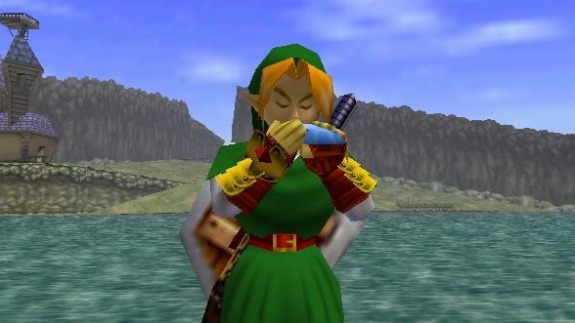
Every 3D Zelda game – with the exception of Hyrule Warriors – owes their gameplay to Ocarina of Time because it’s pretty much the exact same in each one with a few tweaks depending on the title. You equip items on three contextual buttons, you keep one button for the sword, one for the shield, and several more for backflips, targeting, and rolling. Compared to previous Zelda games’ ability to only assign items to two buttons, including the sword, this was definitely a very welcome and major upgrade in terms of open-world gameplay. And the items that you get to improve gameplay are all varied too, with very few of them becoming irrelevant after obtaining them, even if a large part of that is because you need to be either a kid or an adult to use some of them. So it should go without saying that the overall gameplay is still good if you are into Ocarina’s genre Zelda games in particular as long as you’re used to the system’s control scheme.
Combat is fun and easy for the most part with the only real hindrance being Link’s slow running speed, the occasional camera issue, and determining whether Link can jump something or not. The sword fighting is simple and effective whilst using other items is generally a bit more complex due to some targeting issues but nothing close to a game breaker. If there’s one aspect I can say time hasn’t been too kind towards, it’s how you need Navi to be close to an object in order to target it. Targeting systems these days, let alone Zelda ones, just target whoever is closest to you, and it’s still that way today for the most part because it’s a perfectly fine system. But with Ocarina of Time, you have to wait half a second for Navi to fly over to whom you want to target, and that’s if she flies over to that person or object to begin with, leaving you to some cheap shots if she messes up. There are some enemies you can’t even target, like the Moblins preceding the Forest Temple, because Navi suddenly decides she doesn’t want to get close to them.
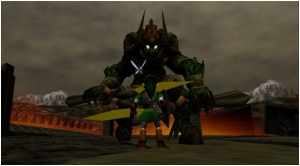
Then there are the actual bosses the game provides you. Although they are generally fun to play against, practically all of them are fairly simple to defeat once you know how to use the tool you acquired from the dungeon itself – which is all but impossible since the tool is usually the main reason you reached the boss in the first place. The one main exception is probably the final boss, as the game doesn’t do the greatest job at explaining when you have to use the light arrows against him, and you don’t even acquire said arrows in the dungeon you fight him at. But regardless of the strategy, all boss fights are won by stunning it and then hitting it a certain amount of times, making them more akin to puzzles. And since they very rarely adapt to your style of combat, this sort of puzzle-style fighting is very simplistic and you’ll easily make short work of them once you know how to stun them.
Finally, no description of gameplay would be complete without the mention of side quests. During his journey, you can make Link fish, engage in trade, participate in bombchu bowling, or collect gold spider tokens. Each of these events have simple rules to follow and they usually reward the player upon completion like the ability to dive longer or carry more items at a time. And once you get the rewards, you can play the games that you have to pay for just to kill time. Whilst the actual quality of these mini-games are entirely dependent on the players’ interests, they are generally fun and you’ll probably spend quite a bit of time doing them while Ganondorf continues to poison the world…you monster. Just don’t hurt any chickens when doing so, as you’ll most likely regret it.
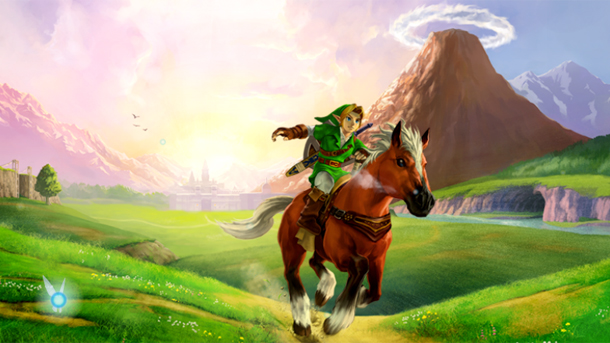
While Ocarina of Time still serves as a fun game in its own right, there is no denying the fact that everything has improved on its formula – including other Zelda games – to the point that there’s nothing truly special about it anymore other than its legacy and the nostalgia towards it that we refuse to let go. If you’ve never played the game and have mostly grown up with its various successors, there’s a moderate probability that you’ll find what it has to offer as functional but toothless, especially since some of its successors have aged far better in terms of story, character, graphics, and even gameplay. By today’s standards, it really lacks anything it can call its own other than introducing some famous characters and even some famous locations whose potential would be realized far better in later installments. Nevertheless, the fact that it’s an important game with a huge lively world to explore and save cannot be denied. And whilst most of us know in our hearts that we probably wouldn’t enjoy Ocarina if we played it for the first time now, we enjoyed it growing up and we continue to enjoy it now.
What do you think? Leave a comment.




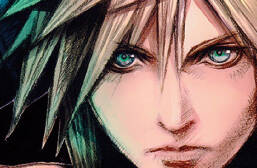






I just bought Ocarina of Time 3D and A Link Between Worlds last week, they’re my first Zelda games (I was a playstation 1 kid), I’m loving them so much.
My first console was the 64 and my first console game was zelda OoT and that game always holds up for me and the undead scared the shit out of me when I was a kid major’s mask I rate the same it gave me the same feel they just resonated really well with each other OoT had a more lighter tone and major’s mask was more dark I liked them both for different reasons.
I think it holds up really well, especially with the 3ds version since it looks SOOO much better and is easier to play.
For cultural trailblazers like Ocarina of Time, I think it is difficult to evaluate them without taking into account the impact they have on the current state of games, or the industry’s history. And while I agree that, out of context, Ocarina doesn’t hold up today without nostalgia, the same can be said of other culturally important pieces. Seinfeld isn’t funny because the jokes it originally made are now sit-com cliches, the classic slasher films aren’t scary anymore because the ideas have been taken and turned up to 11 already, and many classics that were originally read as children stories are now inaccessible by the modern equivalence of that audience because the style is outdated.
Haha I dunno. I’m pretty terrible at modern gameplay. I am still a huge fan of basic no thinking button mashing. So to me, this game will always be epic.
I have to agree with you. My love for this game lies in its ‘simplicity’ and the fact that it still manages to be an absolutely epic adventure even with its easy mechanics. Sure, nostalgia certainly carries its weight here, but if I were to play Ocarina for the first time today I have no doubts that I would still find it impressive and enjoyable.
For me, this was one of my favorite games when as I grew up. At the same time I understand that in the context of todays standing, I personally don’t think it would stand up. The story, as you say, is pretty basic. However, we remember some moments that had us making connections with the characters. For example, when I got to the part where Saria reconnects with Link at the Forest Temple, it left an impression on me. When you left her in the Sage’s Temple, even at a young age I felt a loss. The fact that Link has to watch his friend (who could be even an almost love interest) be left behind to take on this huge responsibility would be devastating. That was just one scene though, and overall it does leave a lot to the imagination. That being said, because of the nostalgic value I there will be a space for this game in my heart. There were things that the creators did that made us fall in love with it and every time I pick it up those feelings are going to be there.
I loved this game. I think we need to keep in mind that it revolutionized. The Legend of Zelda wouldn’t be what it is today if OoT didn’t do what it did. Like you said, open-world wasn’t used much in the 90s, so this game sort of brought it out, made it popular, and people started demanding more.
OOT holds up nicely on N64 buy the 3ds version is a graphic update which doesn’t hurt it. I truly envy those who are new to the game.
I’ve also been trying to catch up on some Legend of Zelda lately. I started last month and have finished Link to the Past, Ocarina of Time (N64), Wind Waker, and I just finished Twilight Princess yesterday! Next up for me is Skyward Sword and after that I’ll come back to Majora’s Mask.
Can’t respect anyone who says their favorite Zelda game is Majora’s Mask and Windwaker. Ocarina of Time, A Link to the Past, and the original NES Legend of Zelda blow those two games out of the water.
Majora’s mask is my favorite LOZ game and I’ve played all of them. It has a tone and feel to that you won’t find in the others at all. I’d say to me they never really stood a chance against majora’s mask.
Honestly having played both OOT and MM both as kid and revisting them as an adult I think that MM feels a lot more focused and intentional. There are wide parts of OOT where it feels like the scope of the game got away from the designers and the game is less tight for it.
Ocarina Of Time is my fave!
My favourite Zelda is Twilight Princess, not the biggest step in the series, but just the best executed version of the Zelda formula.
Ocarina is still playable and fun, but I believe that is largely due to the fact that the Zelda formula hasn’t changed in thirteen years.
^True. The framework laid down by Ocarina of Time (controls, progression, item mechanics, puzzle mechanics), is still used in recent Zelda titles. Only Skyward Sword seems to truly deviate from this, and that’s only because the controls are radically different.
I never played any of the games in the Legend of Zelda franchise. I think it’s because when I was little, I had the demo for Majora’s mask and that game creeped me out, so I never tried the others.
Hi the only Zelda game I have played is the one for Gameboy color, so I found your article very interesting. If you don’t think Ocarina of Time is the game to play, which Zelda game would you recommend? Are aspects of the franchise still worth preserving? Thanks!
I’m a big fan of Majora’s Mask and Wind Waker personally. The latter in particular deserves preservation for its cel-shaded graphics and exploring mechanics, plus Link and Ganondorf are more interesting characters in it.
I’ll investigate those two, thanks!
Ocarina of Time was quite possibly the first video game I played, if not, then definitely one of the first few. For that reason alone it holds a special place in my heart.
i love all the Zelda games but Majora’s Mask is my favorite with WindWaker and Link Between Worlds in 2nd and 3rd i love Skyward Sword the story was amazing.
Reading this gave me so much nostalgia of being 9/10 and cycling to my mates house, going back to mine, booting up OOT… Thank you so much.
I hate OoT. I understand the nostalgia, but the combat is terrible. I don’t think it was much better in Majora’s, but it was finally good by Wind Waker. I guess I’m always in the minority of people who think Ocarina of Time sucks, but that’s just my opinion
you better not say anything bad about ocarina
Played Ocarina of Time on Wii about 4 years ago. First Zelda for me. I spent too much time with figuring out what to do, at some point I got annoyed and got a walkthrough. It’s felt like one big puzzle game, instead of action game. Sometime in the second half of the game I started enjoying it. Definitely not the best game ever for me.
Ocarina of Time is a fossil of a game better left buried and forgotten in the earth. Just kidding. One of a kind.
Nostalgia has a lot to do with why I still love OoT.
I personally prefer Wind Waker, but I enjoy Twilight Princess (the epic feel) and Skyward Sword (some of the most original puzzles were introduced, which I loved). If I had to be honest, my least favorite might be Majora, because of its infuriating dungeon designs.
I only became a Zelda fan as of 2014, but I’d still say that Ocarina of Time and Majora’s Mask have hands down the best stories. I mean, I actually watched someone else “Let’s Play” them just to experience the story–several times!
Ocarina of Time holds up well, despite falling short in some areas with the times. Perhaps the reason it falls short is because of what other games have added onto it’s formula.
I only recently began to dive into the world of Zelda. I have thus far played A Link to the Past, Wind Waker, and Ocarina of Time. As I have begun to see the Zelda community from the inside, it seems that a majority of people’s opinions are based more so on nostalgia and how their game impacted them. I personally don’t regard this is a bad thing and think this is the main reason why Ocarina of Time has stayed relevant for such a long time.
The gameplay is impossible to get outdated.
Not when it keeps re-using the formula every installation.
Nothing is impossible.
One of the things I’ve failed to realize after all these years is how expansive the world of Ocarina of Time is – and how far the lore is spread across the land. Casual video game consumers will not catch on to many of the subtleties and untold stories of the game. Many of the stories you can find are out of the way and, to an extent, are left up to interpretation.
The biggest story (outside of the major storyline) is the Biggoron’s Sword quest – where Link is sent all over Hyrule doing tasks and carrying items for people that all have a connection to the person before them, and the person after them. The second biggest story is how non-Kokiri humans that enter the Lost Woods are cursed to become Stalfos – the skeletons that wander Hyrule Fields at night, and the same creature that teaches Link various techniques in Twilight Princess. Many speculate that this Stalfos warrior in TP was actually Link from Ocarina of Time, who had been transformed after getting lost looking for his fairy.
A lot of games seem to have a plot on a rail. It is determined you will do X, and X will happen every time. You can’t go out and find Y because there is no Y. What Ocarina of Time offers is the ability to go out and explore, and find these stories if you look hard enough.
I agree with you on that! I think Zelda’s story win its story is where the real meat of the story lies especially when looking at the story in congruency with the “official” timeline. It’s all very fascinating to me and that was one of the first things I noticed when I began to play the game. I was getting drawn in by the story within and wanting to learn more about Hyrule itself.
A very nice touch Nintendo. Well done. 😉
I like how this turned out. Legend of Zelda is such a fascinating franchise, even to the outsider such as myself, and I think you made your case remarkably accessible to the non-gamers.
Good work! 🙂
Thank you.
I remember so many arguments in the Zelda community about which is the “definitive” Zelda title, Ocarina of Time, or Link to the Past before it. Problem being is that it all comes down to personal preference that somehow makes people think their preference is the dominant reason for the one game to be the best. For many, OoT explores more of the Zelda mythos with its story, but some feel it robs the exploration. Whereas LttP before OtT, has the exploration, but little story. No real balance, its just both games have their strengths and weaknesses.
But to me, yeah, Ocarina REALLY holds up, it helps too with the remake for the 3DS. It was also the game that got me into the Zelda franchise to begin with and I’m thankful for that. But I remember being there when LttP was around and even then I was never interested in the game, even after finally playing it. Guess I was born to never really like LttP.
Interesting points. I’ve been intermittently playing the N64 version over the past few months and will probably dedicate more time to it over the winter. I don’t think it would be fair for modern gamers to set Ocarina against games currently released. This game helped solidify an already strong franchise and is remembered fondly for so many different reasons. The mere fact that so many people who grew up knowing of this title still light up whenever it gets mentioned in conversation proves its long standing value.
I very much enjoyed this article, particularly your evaluation of the game as more of a work of art than an exercise in graphical limitations. One of the appeals of revisiting the game (even if other Zelda games have done what it attempted better) is it’s role in the history of the Zelda universe – or rather, the timeline that encapsulates the cycle of rebirth and success/failure of the Hero of Time. But I feel that if you enjoy the franchise, it is a game worth playing
I feel that you gave a good objective overview of Ocarina of Time and analyzed the game aspects well. I personally think that Ocarina of Time is worth being played.
This article poses an excellent question to which I have experience the attitude of some younger gamers who only play games for the gameplay and not for the storyline, which is partially what makes this game (and every Zelda game) so epic!
While the legacy of Ocarina and it’s subsequent impact on the gaming landscape is unassailable, the actual quality of the game when reviewed in hindsight is questionable, as this article clearly points out. Personally I think the closest parallel that can be drawn here is with ocarina and the NES original zelda. While both are influential games, they suffer from over worlds which haven’t aged well and exploration and dungeon designs which are overly simplistic in comparison to their successors. This isn’t to say that these games are bad, it’s just that the passage of time haven’t been to kind on them, though enjoyment is still to be had.
Ocarina of Time was one of my first forays into the gaming world so it does hold a special place in my heart. I accept that my nostalgia completely overrides my sense of objectivity. My vote is that Ocarina of Time is still a great game, but I do understand that young people wouldn’t think it was great compared to some of today’s more complex and expansive games.
Just finished the game again today after more than 15 years. Game is still epic.
I think wind waker is the best 3d zelda game.
I think a lot of people do in fact hold onto this game for nostalgia since, as you said, every game has improved on the formula as it was basically the first of its kind. That being said, any new fans of Zelda that become immersed in the world will surely be drawn to this game because of how involved the story is and what a serious role it plays in the Zelda timeline. Every game seems to branch off of Ocarina of Time, so no matter what other Zelda game you’ve played, if you find yourself playing Ocarina of Time, you can relate to some aspect or some element. Like Seasons/Ages have the three sages, and Skull kid made his debut before Majora’s mask. All the characters in other games seem to have at least a small cameo in Ocarina of Time, making it a game any Zelda fan can enjoy.
As a younger person who has played precious few (if any) of the 90s console classics, I can’t help but feel a bit sad that I won’t be able to experience what long term fans of the game have, simply because I’m a couple of decades down the road, and have different expectations of games. Playing most older games can be difficult, even if they’ve aged well. I wish I could play this game with none of the knowledge of what the future of games would hold. I think everyone wishes they could play a game as a kid sometimes. I certainly do.
I believe it will hold up for a while longer still. We’re currently in the “nostalgic” phase, if you will, of Nintendo’s consoles, where remasters are coming out left, right and centre because people wish to have those iconic experiences but don’t own the original dusty cartridges and hard-to-find systems. Hell, the continuous flow of newcomers to OoT via virtual console porting will ensure continued public interest. These sorts of iconic games are constantly referenced by Nintendo themselves even; it seems that they don’t want us to forget. The question is, will they let us?
I really disagree that there is nothing ‘special’ about ocarina these days.
It has an amazing soundtrack, which is perhaps equaled only by Windwaker (maybe).
The dungeons have heaps of awesome moments which I don’t think later Zeldas have been able to top. I’m thinking of the twisted corridor in the Forest Temple, the ship ride in the Shadow Temple, the fight with dark Link in the Water Temple to name a few.
It has the theme of growing up and losing your childhood innocence, and gameplay involving both child and adult Link.
It struck a good balance of openness and linear progression, unlike Twilight princess and Skyward Sword which felt too linear to many people including myself.
Also, from reading comments on several forums, it looks like there have been many, many people who have played the game for the first time only recently (last few years) and absolutely loved it.
How can anyone not think this is cool?
I’m not sure I am convinced about this negative analysis of the world, the character of Link, and the story.
I believe using the size and ability to interact with the entirety of the open world of the Ocarina of Time alone to be a little limiting in judging the world of the game. There are plenty of games, Undertale comes to mind, where the world is not all that big, you cannot interact with all that much, and the graphics are not very good, and yet the world still feels like a convincing and compelling setting for a video game. As long as the world feels like an actual place, I think it can very easily hold up–and I brought up graphics because Undertale’s 8-bit graphics are very much not good by today’s standards, but I did not feel while playing that that made Undertale’s world any less good. Regardless of graphics, size, and interactivity with the world of the game, the player has to exercise their imagination to connect with the world of a video game, so as long as the game does a good enough job convincing the player to put that effort it, I think the game can have a great world.
As far as the basic nature of the character of Link and the story go, I think the history of folk-tales and storytelling throughout the ages go directly against this analysis. Some of the longest lasting and most powerful stories in human history can be seen as some of the most elementary and formulaic. The hero on a quest to save his homeland is simply a timeless story-The Odyssey, the story of Cincinnatus, The Lord of the Rings, Jason and the Argonauts. These epic stories found in the mythology of numerous cultures rely on a protagonist that is relatable by an entire culture. So, if Link did have a strong and specific personality, that would take away the potential power a story like this has. I guess what I am saying is that if this analysis holds, then the tales that have defined human storytelling for thousands of years apparently do not hold up anymore, and I just do not think that is true!
The dungeons in Ocarina of Time HANDS DOWN beat the design of Breath of the Wild’s “Divine Beasts” & Shrines.
That is all.